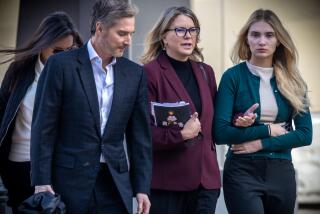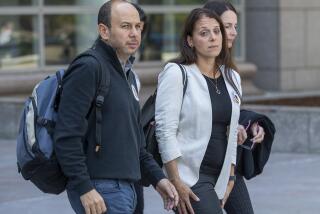High Court Pulls Lawyer Off Case for Missing Deadlines
- Share via
SAN FRANCISCO — In an unusual action, the state Supreme Court on Thursday removed a court-appointed lawyer representing a convicted killer in a notorious Los Angeles murder case, citing the attorney’s “repeated failures” to meet deadlines for filing an opening appeal brief.
The justices, in a terse order, relieved Fred J. Hiestand of Sacramento as attorney for Ricardo Rene Sanders, convicted and sentenced to death as one of two gunmen in the December, 1980, Bob’s Big Boy restaurant massacre that left four people dead.
The rare move took place amid continued concern over the court’s growing backlog of about 200 capital cases and underscored the difficulty of finding lawyers with adequate time and resources to represent defendants in complex appeals.
Warning on 7th Extension
Since December, 1986, Hiestand had sought and was granted seven separate extensions of time in which to file an opening brief in behalf of Sanders. In its last such order on Sept. 1, the court warned the lawyer that there would be “no further extension granted.”
Hiestand, in an interview Thursday, cited a series of unusual occurrences that prevented him from completing the brief, along with increasing demands for his assistance in behalf of other clients in recent months. The work required in a capital case that took six months to try and produced 60 volumes of transcripts was too much for a lawyer with limited help, he said.
“I feel very badly about this,” he said. “When I took the appointment, I thought I would have the time. . . . It’s just real hard for an attorney in private practice, a solo practitioner, to take on a case of this complexity.”
State Deputy Atty. Gen. William Weisman, who will represent the state in the Sanders appeal, acknowledged concern with the delay in this case and other capital appeals.
“It does take a lot of time,” he said. “But I have to say that in my opinion there was more than enough time to file a brief in this instance.”
As often occurs in capital cases, it took nearly three years for the transcripts and other records in the Sanders case to be reviewed and certified by trial attorneys and other officials.
Hiestand, appointed at the standard rate of $60 an hour to handle the appeal, first asked for an extension of time to file the opening brief in December, 1986, citing the need for travel out of state. As is routine, the court granted the request, extending the deadline to Feb. 2.
Reasons for Extensions
But then came six more requests for extensions by the attorney. Among other things, a lawyer working with him on the Sanders case was needed in another capital case; Hiestand acquired a new computer system and had to make changes in the work he had done on the brief; he then lost most of his completed work when the computer “suffered a hard disk crash”; Hiestand, suffering from internal bleeding, was hospitalized with gastritis and later ordered to rest in bed by doctors.
“It was like the ‘Perils of Pauline,’ ” Hiestand recalled Thursday in a voice hoarse from the flu and laryngitis.
On Sept. 28, he made his eighth bid for an extension, saying he was not yet recovered from his illness and was able to put in only eight hours a day instead of his usual 12.
Hiestand, also counsel to the Assn. for California Tort Reform, noted that he also was being required to represent clients on issues before the state Legislature. He asked to be allowed to file the brief “in the month of October.”
The court’s response came in the order released Thursday, relieving Hiestand as counsel and directing him to turn over his draft brief, trial records and other material to the California Appellate Project, the agency that assists defense lawyers in capital cases.
New counsel is to be appointed shortly to represent Sanders in his appeal.
More to Read
Sign up for Essential California
The most important California stories and recommendations in your inbox every morning.
You may occasionally receive promotional content from the Los Angeles Times.













